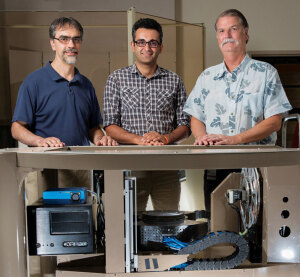by
Lauren Dubinsky, Senior Reporter | May 26, 2017

John Boone (far right) and colleagues
with UC Davis' breast CT scanner
CT imaging may become the next big tool for breast cancer detection.
UC Davis developed a new CT scanner that provides a less obstructed view of potential breast lesions than current 2-D mammography. The university recently signed a licensing agreement that gives Isotropic Imaging Corporation rights to commercialize it.
“We know that MRI, used with a contrast agent, is an excellent tool for breast cancer diagnosis, particularly for women at high risk,” John Boone, professor at UC Davis, said in a statement. “And we think that contrast-enhanced breast CT would be equivalent. But it would also be less expensive, quicker and more comfortable for patients.”



Ad Statistics
Times Displayed: 656
Times Visited: 5 Fast-moving cardiac structures have a big impact on imaging. Fujifilm’s SCENARIA View premium performance CT brings solutions to address motion in Coronary CTA while delivering unique dose saving and workflow increasing benefits.
During the exam, the patient lies face down on a padded table and their breast is placed in a circular opening. The scanner acquires 300 to 500 images of the whole breast, which are then assembled into a 3-D digital model.
The exams take about 10 seconds and uses the same amount of radiation as standard 2-D mammography, without the need to compress the breast.
Boone and his team built four scanners using funds from the National Institutes of Health. As part of a clinical trial, the scanners were used to image over 600 women at the UC David Medical Center and one other institution.
Preliminary results shows that breast CT scanning is significantly better than mammography at finding masses that can later be identified as cancerous. In addition, breast density had much less of a negative impact.
The team is now conducting additional studies to compare non-contrast CT and mammography as a breast screening tool for women at average risk of breast cancer.
This is not the first CT scanner designed to detect breast cancer. In February 2015, Koning Corporation received
FDA approval for its Koning Breast CT system, which already had regulatory approval in Europe, Canada and Australia.
Then in March 2016, Canon
displayed its Cone Beam Breast CT scanner at the ECR annual meeting in Vienna. The company previously unveiled the concept for the system in October of that year at the Canon Expo in Paris.
The license between UC Davis and Isotopic Imaging provides the company with rights to patents covering novel methods of breast cancer imaging and diagnosis. That includes a unique algorithm that compensates for imaging differences throughout the breast tissue.
Isotropic Imaging is currently assessing options to fast-track applications with regulatory authorities in the U.S. and other countries. The company is also finalizing business and marketing plans to prepare for market launch.
Back to HCB News

